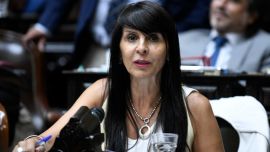President Alberto Fernández says Argentina is seeking to reduce its fiscal deficit and accumulate Central Bank reserves, underlining that he is committed to the country’s US$44.5-billion debt programme with the International Monetary Fund.
Argentina is facing runaway inflation nearing 60 percent and another week of turmoil on the exchange markets has piled further pressure on the government, with analysts questioning whether the country can hit the targets outlined in its Extended Fund Facility programme with the multilateral lender and openly discussing the prospect of a devaluation of the peso later this year.
Speaking this week, however, Fernández said Argentina remained committed to the deal and the key targets agreed with the IMF.
"The state is making its contribution, trying to reduce the fiscal deficit, which has a negative effect on the economy, and trying to accumulate reserves at a time when we have a very strong demand for dollars because the economy is growing a lot," Fernandez said in an interview with the C5N news channel.
Argentina’s agreement with the Fund calls for a reduction in its primary fiscal deficit from the three percent of gross domestic product recorded in 2021 to 2.5 per cent in 2022, followed by 1.9 percent in 2023 and 0.9 percent in 2024.
Last Friday, the IMF’s Executive Board approved the first review of the programme, corresponding to the first quarter of this year, and authorised a disbursement of US$4.01 billion to bolster Central Bank reserves.
But this week there have been strong movements in the markets, both in debt bonds and the parallel exchange rate, while Argentina’s country risk, as measured by the JP Morgan investment bank, reached over 2,500 points.
The president sharply criticised the opposition and "speculators" for their negative forecasts.
"They raised the spectre [of default], they drove bond prices to the floor and we met" the stipulated payments, he said. "I'm not asking them to help me, I'm asking them to shut up because they confuse [everyone] with their adverse expectations."
Addressing Argentina’s stalling attempts to accumulate reserves, the president argued that it should be done if "guaranteeing that the country continues to grow, fundamentally the small and medium-sized companies" and defended the measures taken this week to limit the allocation of foreign currency to imports of gas and inputs for industry, discouraging purchases of luxury and non-strategic goods.
"We have asked multinational companies to look at the possibility of financing themselves with their own resources in order to preserve SMEs," he confirmed.
Gross international reserves stood at US$42.471 billion on Wednesday, according to the Central Bank.
Argentina’s current economic difficulties are occurring "in a scenario of inflation that complicates" life, Fernández acknowledged.
Inflation has risen 60.7 percent over the last 12 months, according to official data from the INDEC national statistics bureau.
"We all have to work together to somehow anchor inflation expectations," added the Peronist leader.
Strike on way
The government’s plan to boost reserves looks set to be complicated by strike action from a key sector of the economy.
The farm leaders of the Comisión de Enlace on Wednesday called a stoppage for next July 13 to protest the almost nationwide lack of diesel. They also demanded "solutions to high inflation, the split exchange rate and the obstacles to imports."
"It is urgent to gain access to gasoil and fertilisers to avoid a total paralysis of the productive machinery. It is also necessary to have less damaging intervention, lower public spending and an end to the energy crisis to make everything possible," pointed out the farm leaders.
In the midst of the diesel crisis in 23 of the 24 districts, the four organisations of the Comisión de Enlace – the Sociedad Rural, the Federación Agraria, the Confederaciones Rurales and Coninagro – announced a day of protest with a halt to marketing.
Nicolás Pino, president of the Sociedad Rural, stated: "We summoned the whole productive and agro-industrial chain of the sector and after a day very rich [in discussion] we have prepared a document entitled: Preocupados, con una visión en común y unidos para que la Argentina vuelva a crecer (“Worried, with a common vision and united so that Argentine returns to growth”)."
President Fernández questioned the strike announced by the farm leaders, considering that it would not resolve the problem of the lack of diesel since (he highlighted) it was lacking worldwide.
"The government is giving them diesel, the greatest cost in our energy imports is diesel. What they have to understand is that the whole world lacks diesel, not just Argentina," he underlined.
– TIMES/AFP/NA
























Comments